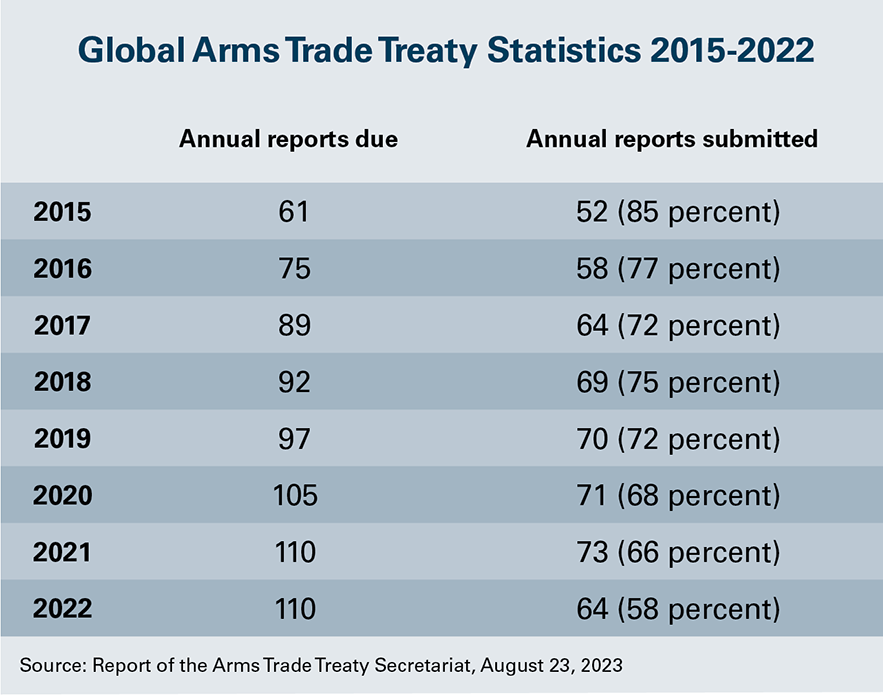"No one can solve this problem alone, but together we can change things for the better."
Industry a Focus at Latest ATT Meeting
October 2023
By Jeff Abramson
As the war in Ukraine drags on, the relationship of industry to the Arms Trade Treaty (ATT) was a special topic of this year’s annual conference of ATT states-parties.
 No binding commitments were made, but the final report approved by the conference Aug. 25 encouraged states-parties to deepen contacts with industry on the issue of responsible international transfers of conventional weapons and to engage industry in future ATT meetings.
No binding commitments were made, but the final report approved by the conference Aug. 25 encouraged states-parties to deepen contacts with industry on the issue of responsible international transfers of conventional weapons and to engage industry in future ATT meetings.
South Korea announced in 2022 that industry’s role in responsible arms trade would be the special focus of its presidency at this year’s ATT conference. At the time, many civil society experts hoped that would include pushing industry to do a better job of accounting for human rights concerns in their company assessments and practices, often called “human rights due diligence.”
There was some reference to those issues in the report, but more attention was paid simply to improving engagement and sharing resources.
In a statement during discussion of industry, Control Arms, a coalition of civil society advocates, argued that South Korea’s approach was to define what benefits industry could gain from engaging ATT member states, rather than what responsibilities industry should undertake “to mitigate the demonstrable humanitarian cost of the international arms trade.”
For many years, ATT conference presidents have chosen different themes for special discussion, but those topics have not necessarily remained in the spotlight at future meetings. How or if engagement with industry will be tackled during future ATT conferences remains to be seen.
The United Nations established “guiding principles on business and human rights” in 2011. In recent years, there has been increased attention as to whether and how the arms industry has been implementing those principles and the human rights due diligence approaches that have evolved since 2011.
A 2022 report by the UN working group on business and human rights found that the arms industry was failing to adequately conduct such diligence. The report explained that because governments generally are responsible for approving arms transfers, arms companies argue that their compliance with national laws acts “as a substitute for human rights due diligence.”
In Europe, there is an ongoing discussion of whether to exempt the arms industry from a separate directive being developed on corporate responsibility, hinging in part on whether arms manufacturers are accountable for what end users do with their products.
A paper presented by South Korea as president of the ATT conference mentioned the UN guiding principles and included a reference to the UN working group document in an annex. A separate paper sponsored by Austria, Ireland, and Mexico more explicitly called attention to human rights due diligence practices and the 2022 report.
Despite the ongoing major transfer of conventional weapons to combatants in Russia’s war on Ukraine, Russia and Ukraine are not mentioned in the meeting’s final report. Historically, ATT final reports have not addressed specific arms transfers or conflicts.
As it did last year, the European Union indicated in its statement that supplying arms to Ukraine would be consistent with the treaty but those weapons transfers to Russia should not be permitted. Ukraine has signed but not ratified the ATT, and Russia is not a party to it. Neither attended the meeting.
Compliance with annual national reporting of arms transfers, which is required by the treaty, continued to be low. The ATT Secretariat reported that 58 percent of states-parties submitted such reports for 2022, down from 66 percent a year earlier and 85 percent in the first year of the treaty. In December, Andorra ratified the treaty, bringing the total states-parties to 113.
The United States, whose 2013 signature to the treaty was rejected in 2019 by President Donald Trump, again sent a delegation to the meeting. In February, Washington issued a new conventional arms transfer policy, but has not announced a new approach to the treaty. (See ACT, April 2023.) In 2021, it had indicated that that policy would inform the U.S. relationship to the treaty.
The 10th conference of ATT states-parties, led by Romania, will be held in Geneva in 2024.
